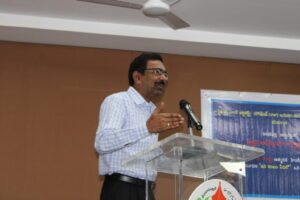Hyderabad, August 25: At a special literary gathering held at the Press Club, Basheerbagh, the Telugu translation of writer K. Rajanna’s Hindi autobiography “Faansi” was formally launched. The book, translated into Telugu by Dr. Karam Shankar as “Uri Kambam Needlo” (“Under the Gallows”), was unveiled by retired judge Mangari Rajender ‘Jimbo’ under the joint auspices of the Writers and Journalists Association (WAJA) Telangana and Kaviyatri. The event was chaired by noted poet Mahakavi Nikhileshwar, with the proceedings initially conducted by Dr. C. Kameshwari.
The book, which captures Rajanna’s harrowing yet inspiring prison life, was widely praised by speakers for its relevance and authenticity. Rajanna himself had once been sentenced to life imprisonment. During his incarceration, he not only completed his education through correspondence but also earned a degree in journalism. After his release, he worked with reputed media organizations, and his autobiography “Faansi” was born out of that lived experience — a narrative etched with what many described as “ink of the heart.”

Judiciary and Literary Voices Applaud the Work
Presiding over the event, Nikhileshwar recalled that he had chaired the launch of Faansi six years earlier and expressed pride in now leading the release of its Telugu version. He noted that Rajanna’s commitment to reading and writing during his prison years shaped him into a remarkable author. “Rajanna’s life reflects the inequalities within our system and serves as an inspiration. His autobiography deserves to be made into a film — especially now in Telugu, it will have greater resonance,” he said. He added that Rajanna’s journey would serve as a guiding light for Dalit and Bahujan youth.

Judge Mangari Rajender offered candid reflections, stating that arrogance often influenced judicial decisions, even at the highest levels. Referring to Rajanna’s trial, he suggested that the death sentence may have been delivered more out of ego than justice. “This book is a mirror to the flaws of our judicial system and a reminder of the injustices faced by the poor and marginalized,” he remarked, urging wider translations to reach a larger audience.
Senior journalist Dr. K. Srinivas noted that Rajanna entered and left prison as a reformed and dignified citizen. Editor N. Venugopal of Veekshanam observed that Rajanna’s resilience is itself a lesson for society and confirmed that the book will soon be translated into Bengali and English as well.



Voices from the Literary & Social Sphere
Poet Dr. Ahilya Mishra emphasized that systemic weaknesses had forced Rajanna to endure such hardships, while Additional Collector and poet Enugu Narasimha Reddy analyzed select passages of the book, describing them as emotionally powerful and historically significant. He stressed that the book highlights caste, poverty, and legal inequality — making it essential reading for youth.



WAJA Telangana president N.R. Shyam recalled the extensive discussions with writers such as Allam Rajayya that preceded Rajanna’s decision to pen Faansi. Journalist F.M. Saleem from Daily Hindi Milap said the book exposes how arrogance and misuse of power disrupt lives like Rajanna’s. Translator Dr. Karam Shankar shared his emotional journey while translating the book, saying he often felt deeply moved while working on the manuscript.
Other speakers, including Dalit leaders and social activists, hailed Rajanna as a role model, citing his transformation in prison and his commitment to education. They congratulated him on bringing his experiences to literature.



A Journey Beyond Prison Walls
What makes Uri Kambam Needlo compelling is not just its literary merit but also its testimony to resilience against adversity. Most readers agreed that the book, once begun, holds the reader till the last page. With its Telugu release, the book’s reach has widened, and Rajanna now plans translations into multiple languages.
The event concluded with formal remarks from WAJA Telangana General Secretary Deva Prasad Mayla, a brief note on Kaviyatri’s activities by its secretary B. Venkat, and a heartfelt vote of thanks from Rajanna himself.





